
A Sense of Doubt blog post #2355 - FIND THE PERSON WHO HIRED THE HIT MAN: January Sixth Insurrection Commission - Historical, Powerful, and FINDING THE TRUTH
The original January 6th Commission -- a 9/11 style commission -- passed in the House but was defeated by craven officials in the Senate who fear the loss of the power if the truth of what happened in the STORMING OF THE CAPITOL on January 6th, 2021 would be in the official record of the federal government.
A Sense of Doubt blog post #2152 - Welcome to Trump's America - Insurrection 2021 - January 6th - Day of Shame
How anyone can deny what happened, who is responsible both for the violence and instigating the violence, let alone how anyone can MOCK the trauma, injury, pain, and death the brave officers defending our country endured is beyond me. But more on that tomorrow.


4 Takeaways From
The Emotional 1st Select Committee Hearing On The Capitol Attack
DEIRDRE WALSH
The stunning attack on the U.S. Capitol by a mob of Trump
supporters roughly six months ago threatened lawmakers and came close to
upending the process to certify the 2020 presidential election.
Most
members of Congress decried the onslaught in the hours after the Jan. 6
insurrection, but since then the date has become a deeply polarizing moment on
Capitol Hill.
After Senate Republicans blocked a
bill to create an independent commission to investigate the attack, the House
established a select committee to
lead the probe.
The panel's first hearing on Tuesday was emotional as four law
enforcement officers who defended the Capitol that day gave firsthand accounts
of being overrun, assaulted, and harangued by rioters as "traitors."
All described lingering physical and emotional trauma. Some rioters hurled
racial epithets at African American officers.
The
four officers' gripping testimony, accompanied by horrific images from police
body cameras played by the Democratic-led committee, did not reveal much new
information. But it launched the investigation with a compelling reminder of
what was at stake as the seat of the federal government came under violent
attack.
Several times during the
hearing both the witnesses and some of the lawmakers on the dais teared up and
struggled to gain composure as they relived that day.
Sgt. Aquilino
Gonell of the U.S. Capitol Police, an Army veteran who served in Iraq,
described the scene on the complex's West Front, where officers were
outnumbered by thousands of people wielding bats, flagpoles and other items
used to pummel the police. He said he thought to himself, "This is how I am going to
die."
Another
officer, Michael Fanone of the Washington, D.C., Metropolitan Police
Department, called the hand-to-hand combat between police and rioters
"nothing short of brutal." Fanone said he was Tased repeatedly and
dragged into the crowd as members of the mob took his gun and threatened to
shoot him with it.
He
was visibly angry at lawmakers who have since downplayed the violence that day.
Fanone told the panel, "I feel like I went to hell and back to protect
them."
"The
indifference shown to my colleagues is disgraceful!" he shouted, pounding
the table.
1.
Officers point the finger at Trump for inciting supporters
U.S.
Capitol Police Pfc. Harry Dunn said what happened on Jan. 6 was political and
that those participating had a mission: "They literally were there to
'stop the steal,' " he said, using a phrase former President Donald Trump
and his supporters invoked to falsely claim that the 2020 election results were
illegitimate.
Dunn
said he wants the committee to look at why rioters were there that day.
"If
a hit man is hired and he kills somebody, the hit man goes to jail," he
told the panel. "But not only does the hit man go to jail, but the person
who hired them does. There was an attack carried out on Jan. 6, and [someone]
sent them. I want you to get to the bottom of that."
Dunn, a Black officer who has
been with the department for more than 14 years, said he was called the
N-word after acknowledging to rioters that he voted for Joe
Biden for president.
Officer
Daniel Hodges of the D.C. Metropolitan Police repeatedly used the word
"terrorists" to describe those involved in the siege, and he defended
the term by coming prepared with the U.S. Code definition of domestic
terrorism.
Hodges
said rioters pledged support to Trump as they assaulted officers. He said they
appealed to him to join their effort to take the building, and he said they
tried to "convert us to their cult."
2. Murphy reveals
rioters were 40 paces from two lawmakers
Florida
Rep. Stephanie Murphy, one of the seven Democrats on the nine-person committee,
revealed for the first time Tuesday how close the throng of rioters came to her
and New York Democratic Rep. Kathleen Rice.
She
described how the two lawmakers were holed up in a room in the basement of the
Capitol, a location they thought would be the most secure in an emergency. But
she said that the two were just "40 paces" from where Officer Hodges
and others clashed with rioters attempting to breach the West Front entrance.
She
told Hodges she could hear the screams of those being attacked just yards away.
She said that without his bravery, and that of others there that day, "I
shudder to think had you not held that line" what could have happened to
her and others.
In
the second Trump impeachment trial, earlier this year, the House impeachment
managers showed video of then-Vice President Mike Pence and senators being
evacuated from the Senate chamber on Jan. 6, minutes before many pro-Trump
protesters walked into the chamber.
3.
McCarthy's move to boycott the panel leaves Trump without a defense
House Minority Leader Kevin
McCarthy, R-Calif., made the call to pull all five members he named to the
select committee after House Speaker Nancy Pelosi, D-Calif., vetoed two of them —
Reps. Jim Jordan of Ohio and Jim Banks of Indiana.
Pelosi's
move was unprecedented because no leader had blocked another party from
installing their members for a select committee, but she argued that the
statements and actions from Jordan and Banks made it untenable for her to
accept them. The resolution creating the panel gave the speaker the power to
block GOP picks.
Instead,
Pelosi tapped two Republicans, Wyoming's Liz Cheney and Illinois' Adam
Kinzinger, who both voted to impeach Trump and have been strong critics of the
former president.
And
they both used their platform during Tuesday's hearing to argue that defending
the rule of law was more important than loyalty to a political leader.
Cheney, for instance, asked Sgt. Gonell about Trump calling the
group at the Capitol a "loving crowd." He retorted that it was
"pathetic" and that he was "still recovering from those 'hugs
and kisses' that day."
McCarthy
scheduled a press conference ahead of the hearing as a chance for GOP leaders
and those he wanted on the committee to do a prebuttal. He said the panel was a
"sham" and he and others at the event attempted to blame Pelosi for
security failures at the Capitol on Jan. 6. None provided any evidence, and the
speaker does not directly oversee the U.S. Capitol Police.
The
GOP leader's decision not to participate in the select committee meant that the
3 1/2 hour hearing that was carried live by many news outlets did not include
any GOP lawmaker defending the former president or raising the security issues
Republicans say should be central to its probe.
No
senior official from the Trump administration has testified in any of the
hearings conducted by House or Senate panels to date, and without any allies on
the select committee, the former president has no one defending him.
4.
The committee could subpoena the former president and other Republicans
Chair
Bennie Thompson, D-Miss., didn't rule out subpoenas for Trump and other senior
White House officials, telling reporters after the hearing, "We will
follow the facts." He indicated that the committee could schedule a
hearing next month, even though the House is scheduled to take its regular
August recess.
Cheney
made it clear that getting testimony from those around Trump that day is
essential. "We must know what happened every minute of that day in the
White House," she said. She has stated recently that Jordan is potentially
a "material witness." And McCarthy's telephone conversation with the
president that day, a topic that came up during the impeachment trial, could be
something the committee wants to hear more about directly from the California
Republican.
Rep. Adam Schiff, D-Calif., a
member of the panel, told NPR on Tuesday that
"we'll do whatever is necessary to make sure we get the answers, and no
one is off the table," including the former president or members of
Congress.
Officer
Hodges implored the committee at the end of the hearing, "I need you guys
to address if anyone in power had a role in this, if anyone in power
coordinated, or aided and abetted" what happened that day.
The
Justice Department, now under the Biden administration, decided Tuesday that
former government officials could not invoke executive privilege to avoid
testifying about conversations with Trump or his advisers about the
insurrection.
| Daniel Hodges of the Washington, D.C., Metropolitan Police Department watches footage from his body camera during Tuesday's hearing. Jim Lo Scalzo/Pool photo/Getty Image. |

'The physical violence we experienced was horrific and
devastating': Officers recount harrowing events of Capitol insurrection
By Clare Foran, Jeremy Herb, Lauren Fox and Annie Grayer, CNN
Updated 11:12 PM ET,
Tue July 27, 2021
(CNN)The House select committee investigating the January 6 attack on the Capitol kicked off its first
high-profile hearing Tuesday with harrowing testimony from officers who
experienced firsthand the violent events of that day at the hands of a
pro-Trump mob.
The vivid testimony puts witness accounts on
the record and a national spotlight on the insurrection, once again forcing a
reckoning over the tragic events of January 6 for lawmakers on Capitol Hill as
well as the American public. Regardless of the testimony's raw power,
entrenched partisan battle lines in the months following the attack and during
the shaping of the select committee have ensured that few minds are likely to
be changed. Democrats have denounced the Capitol riot as an attack on
democracy, while Republicans have almost uniformly downplayed and dismissed the
insurrection's implications, especially former President Donald Trump's
incitement of it.
The committee heard gripping and emotional
accounts from four officers -- DC Metropolitan Police Officers Daniel Hodges
and Michael Fanone and Capitol Police Officer Harry Dunn and Sgt. Aquilino
Gonell -- and will use the testimony as a jumping-off point for embarking on a
probe that could lead to seeking testimony and documents from the former
President, his aides and even Republican members of Congress.
The officers described the horrors they
witnessed and endured as rioters stormed the building after
Trump incited them to do so, and recounted the assault they faced on January 6
-- including being beaten with their own equipment, getting crushed in a
doorway, being the target of racial slurs and facing rioters who tased them.
Their gripping testimony drove multiple lawmakers on the committee to grow
emotional as part of their questioning.
"I never expected today to be quite as
emotional for me as it has been" said Rep. Adam Kinzinger, one of two
Republicans on the committee, who appeared to get choked up during his initial remarks. "I've talked to a
number of you and gotten to know you."
The witnesses made clear that the trauma and
injury of the insurrection have had long-lasting consequences that they are
still struggling to deal with now. They spoke of how painful it has been to see
attempts to whitewash the insurrection, including by members of Congress, and
called for a rigorous investigation to get to the bottom of what happened to
ensure it is never repeated.
"The physical violence we experienced was horrific and
devastating," Gonell told the committee. "My fellow officers and I
were punched, kicked, shoved, sprayed with chemical irritants and even blinded
with eye-damaging lasers by a violent mob."
"I was particularly shocked at seeing the
insurrectionists violently attack us with the very American flag that they
claimed they sought to protect," he said.
Fanone said that he was "grabbed, beaten,
tased, all while being called a traitor to my country," and "was at
risk of being stripped of and killed with my own firearm as I heard chants of
'kill him with his own gun.' I can still hear those words in my head
today."
Taking aim at efforts to rewrite the history
of the insurrection, he said, "What makes the struggle harder and more
painful is to know so many of my fellow citizens, including so many of the
people I put my life at risk to defend, are downplaying or outright denying
what happened."
"I feel like I went to hell and back to
protect them and the people in this room, but too many are now telling me that
hell doesn't exist or that hell isn't that bad," Fanone said. Visibly
upset, he said, "The indifference shown to my colleagues is
disgraceful."
Many Republican fmembers of Congress have sought to downplay the
insurrection in the weeks and months since it occurred, even some who
forcefully denounced the events in the immediate aftermath of the attack.
In one notable example of that, GOP Rep. Andrew Clyde has compared some scenes of the
insurrection to a "normal tourist visit."
Rep. Liz Cheney of Wyoming, the other Republican lawmaker
serving on the committee alongside Kinzinger, said in her opening remarks,
"On January 6 and the days thereafter, almost all members of my party
recognized the events of that day for what they actually were," and then
said, "No member of Congress should now attempt to defend the
indefensible, obstruct this investigation or whitewash what happened that
day."
In his comments, Kinzinger sought to dismantle misinformation
and call out his own party for trying to delegitimize the efforts of the select
committee.
"For all the overheated rhetoric surrounding this
committee, our mission is very simple: it's to find the truth and it's to
ensure accountability," Kinzinger said. "Many in my party have
treated this as just another partisan fight. It's toxic and it's a
disservice."
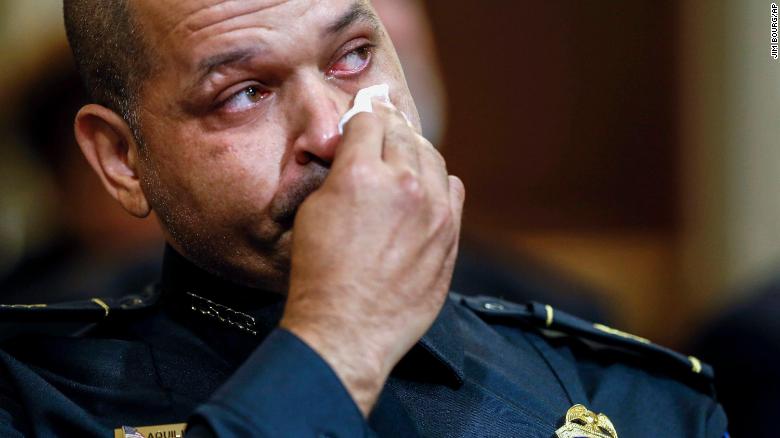 |
| U.S. Capitol Police Sgt. Aquilino Gonell wipes his eye as he watches a video being displayed during a House select committee hearing Tuesday. |
'The task of this committee will require persistence'
The hearing started with a warning from Democratic Chairman
Bennie Thompson that "we cannot allow ourselves to be undone by liars and
cheaters," while Cheney, one of two GOP members on the panel, called for
prompt enforcement of subpoenas.
"The task of this committee will require persistence,"
Cheney said in her opening remarks. "We must issue and enforce subpoenas
promptly. We must get to objective truth. We must overcome the many efforts we
are already seeing to cover up and obscure the facts."
In a reference to Trump's role in January 6, Cheney said it is
imperative to "know what happened every minute of the day in the White
House. Every phone call, every conversation, every meeting leading up to,
during and after the attack."
At the start of the hearing the committee showed video footage
with graphic content depicting the violent storming of the Capitol, including
rioters making threats directed at House Speaker Nancy Pelosi and former Vice
President Mike Pence.
"These rioters were organized. They were ready for a fight
... they came close to succeeding," Thompson said in his opening
statement. "It's frightening to think about how close we were. A few
inches of wood and glass. An officer turning left instead of turning
right."
As he denounced the "Big Lie" spread by former
President Donald Trump that the election was stolen, Thompson said, "We
know that efforts to subvert our democracy are ongoing, and a major part of the
Select Committee's work will be to find ways to eliminate that threat."
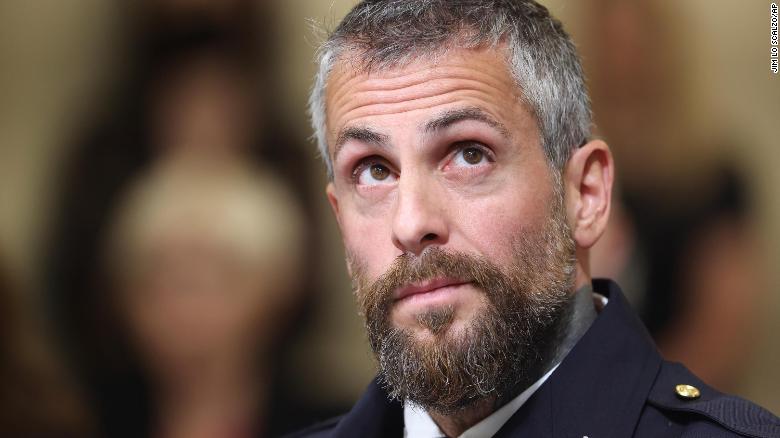 |
| Washington Metropolitan Police Department officer Michael Fanone watches as a video being displayed during the hearing Tuesday. |
Officers recount vicious attack
Body-camera footage shows how Fanone was pulled into the crowd
and tased repeatedly with his own stun gun. Gonell was beaten with a flagpole
and his hand was sliced open. Dunn has spoken out about the racist attacks he
and other Black officers faced that day. And Hodges was the officer in one of
the most harrowing and well-known scenes from the riots, when he was writhing
and screaming in pain while crushed in a doorway by a crowd of rioters.
"The two sides were at a stalemate at a metal door
frame," Hodges said during his testimony as he recalled the horrific
scene. "I inserted myself so the frame was at my back in an effort to give
myself something to brace against," he said, describing how his arms
became pinned and "a man seized the opportunity of my vulnerability,
grabbed the front of my gas mask and used it to beat my head against the
door."
Hodges described the rioters as "terrorists" and
likened the mob to a "cult," saying at one point during his
testimony, "terrorists pushed through the line and engaged us in hand-to
hand combat ... one latched onto my face and got his thumb in my right eye,
attempting to gouge it out. I cried out in pain and managed to shake him
off."
Dunn, who is Black, testified that the rioters repeatedly
targeted him with him vicious racial slurs and called him the n-word.
"In the days following the attempted insurrection, other
black officers shared with me their own stories of racial abuse on January
6," he said.
At one point, he recalled growing emotional and yelling,
"Is this America?" as he began sobbing while other officers tried to
console him.
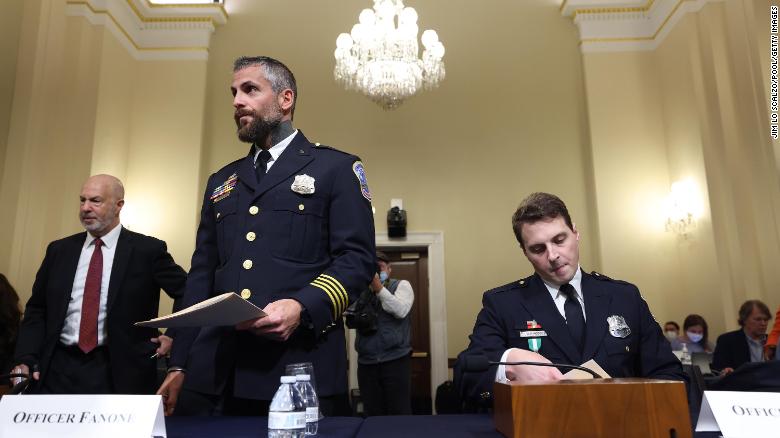 |
| DC Metropolitan Police Department Officers Michael Fanone (at left) and Daniel Hodges (at right) arrive to testify before the committee hearing. |
Long-lasting
consequences of the assault
Testimony during the hearing underscored how the aftermath of
the insurrection continues to have a devastating effect on front-line
responders and those who witnessed the events firsthand.
Recalling the violence, Fanone said, "Doctors told me that
I had suffered a heart attack and I was later diagnosed with a concussion,
traumatic brain injury and post-traumatic stress disorder."
"I have been left with the psychological trauma and the
emotional anxiety of having survived such a horrific event," he said.
During an interview with CNN's Don Lemon later Tuesday, Fanone said he had
received an angry voicemail with a number of profanities and slurs aimed at him
while he was testifying earlier in the day.
Dunn said in his testimony, "More than six months later,
January 6 still isn't over for me ... I'm now receiving private counseling
therapy for the persistent emotional trauma of that day."
He added, addressing fellow officers specifically, "There is
absolutely nothing wrong with seeking professional counseling. What we went
through that day was traumatic."
Calls
for a rigorous investigation and what comes next
At the end of the hearing, Thompson asked the officers what they
hope the committee will accomplish.
Hodges implored the committee to take action, saying, "As
patrol officers, we can only deal with the crimes that happen on the streets
... you guys are the only ones we've got to deal with crimes that occur above
us."
"I need you guys to address if anyone in power had a role
in this. If anyone in power coordinated, or aided or abetted, or tried to
downplay, tried to prevent the investigation of this terrorist attack because
we can't do it."
The emotional testimony marks the start of the committee's
investigation into the circumstances surrounding the attack as Democratic
leaders look to set the tone for a panel that congressional Republicans have
dismissed as a political sideshow created merely to discredit the legacy of the
former President.
The hearing will be just the beginning. In the weeks ahead, the panel of seven Democrats and two Republicans, all
appointed by House Pelosi, will contend with how they can make the biggest
impact, how to choose which documents to seek and, perhaps most importantly, to
decide whether they will try to force Trump -- as well as some of their Republican colleagues who spoke to him that day --
to testify.
Democrats had pushed for an independent commission to get to the
bottom of how pro-Trump supporters breached the Capitol in a deadly riot,
attacked police officers and disrupted the certification of Joe Biden's
November election win. After Senate Republicans blocked the commission,
Pelosi moved forward with a select committee.
Pelosi has sought for the select committee to be able to provide
an exhaustive accounting of the events surrounding the attack, the former
President's role, how extremist groups were able to organize and how security
failures resulted in the deadly clash. But the California Democrat has also
taken steps that have infuriated House Minority Leader Kevin McCarthy,
including shutting down two of his picks for the select committee because of
their past statements and actions that bolstered Trump's false narrative about
the election being stolen.
Pelosi named Cheney to the select committee, and after she rejected
Reps. Jim Jordan of Ohio and Jim Banks of Indiana, McCarthy pulled the rest of the Republicans from the committee.
Pelosi responded by adding Kinzinger to the panel, in an effort to give it
bipartisan credibility even without McCarthy's participation.
Cheney and Kinzinger have faced sharp blowback
for joining Pelosi's committee, with conservatives arguing that they should be
removed from their other committee slots. The two members have said those
threats won't deter them.
"If the conference decided or if Kevin
decides they want to punish Liz Cheney and I for getting to the bottom and
telling the truth, I think that probably says more about them than it does for
us," Kinzinger said Monday.
This story and headline have been updated with
additional developments Tuesday.
CNN's Manu Raju, Paul
LeBlanc, Melanie Zanona and Ryan Nobles contributed to this report.
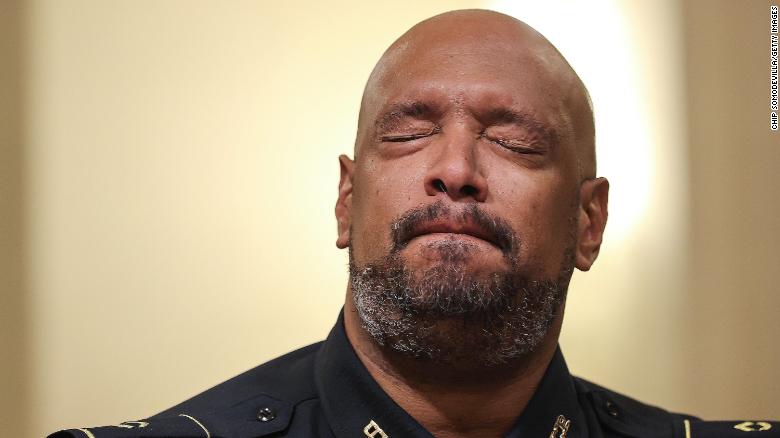
US Capitol Police officer Harry Dunn becomes emotional as he testifies before the committee Tuesday.
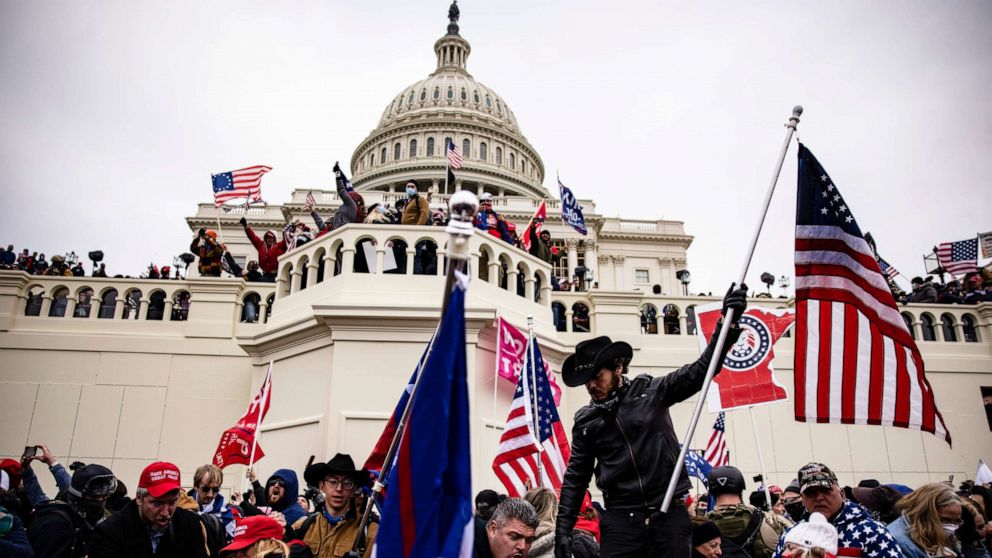

https://www.washingtonpost.com/national-security/2021/07/31/january-6-committee-witnesses/
Jan. 6 committee faces unprecedented
choice of whether to call Republican lawmakers to testify
Several congressional Republicans have admitted to having some
contact with President Donald Trump during the insurrection or in the days
leading up to it, making their testimony potentially key to the panel’s stated
goal of being ‘guided solely by the facts’
By
Karoun Demirjian,
Marianna Sotomayor,
and Jacqueline Alemany
Today at 8:02 a.m. EDT
The
leaders of the House committee investigating the Jan. 6 attack on the Capitol
are promising a vigorous inquiry into a day they have called a threat to
American Democracy, which could lead to an unprecedented legal and political
showdown over how to force members of Congress to take the witness stand.
The
Jan. 6 panel’s chairman, Rep. Bennie G. Thompson (D-Miss.), said in an interview
that there is “no reluctance to subpoena” any member of Congress “whose
testimony is germane to the mission of the select committee” if they resist
cooperating voluntarily.
Thompson
said the panel will be seeking the White House telephone and visitor logs to
further scrutinize which members were in touch with the White House on Jan. 6.
“I would say between noon and 6 p.m., any call that went
to the White House, you assume had to be something that had to do with it,” he
said.
But
legal experts said there is little precedent for forcing lawmakers to testify
as part of a congressional inquiry if they resist a subpoena, an issue members
of the Jan. 6 panel said they have yet to fully investigate or plan for as they
plot out the next steps of their probe.
“I don’t know what the precedent is, to be honest,” said
Rep. Adam B. Schiff (D-Calif.), a member of the committee who oversaw the first
impeachment trial of Trump and has one of the heftiest investigative résumés in
the House. “Obviously we will have to look into all those questions.”
Members of the executive branch have often
avoided or delayed for years appearing before Congress by asserting executive
privilege. Lawmakers on the Jan. 6 panel are hoping that tactic will be less useful
to former Trump administration officials after the Justice Department recently
said it would break from tradition and not invoke that privilege with regard to
inquires regarding the attack on the Capitol.
But
while the steps are clear — if arduous — for compelling administration
officials to testify, that’s not the case when it comes to lawmakers.
“I don’t recall a case where members of Congress were
subpoenaed to an oversight hearing,” said Stanley Brand, an expert on
congressional ethics investigations and the former House counsel from 1976 to
1983.
House
Minority Leader Kevin McCarthy (R-Calif.) and Rep. Jim Jordan (R-Ohio) have
been the recent subject of questions about which members could be called to
appear before the select committee.
Earlier this year, Rep. Jaime Herrera Beutler (R-Wash.)
described what McCarthy told her about a phone call he had with Trump on Jan. 6
in which he asked the president to help calm his supporters who had broken into
the Capitol.
“When McCarthy finally reached the president on January 6
and asked him to publicly and forcefully call off the riot, the president
initially repeated the falsehood that it was antifa that had breached the
Capitol,” Herrera Beutler said in a statement in
February, referring a to a loosely knit group of far-left activists. “McCarthy
refuted that and told the president that these were Trump supporters. That’s
when, according to McCarthy, the president said: ‘Well, Kevin, I guess these
people are more upset about the election than you are.’ ”
Jordan for months has seemed to indicate that he
spoke to Trump that day, but would obfuscate when asked specifically if he
talked to him on Jan. 6, saying he spoke to the president all the time. But
this week he confirmed to a local television reporter that he did talk to
Trump while not revealing the content of their discussion or what time the
phone call occurred.
“I spoke with him that day, after?” Jordan said
during an interview with Spectrum News, in which he was asked to clarify previous
comments. “I think after. I don’t know if I spoke with him in the morning or
not. I just don’t know. … I don’t know when those conversations happened.”
House
Speaker Nancy Pelosi (D-Calif.) recently rejected Jordan and
one other of the five members McCarthy proposed to represent the minority side
on the select committee, prompting GOP leaders to boycott the panel. Jordan’s
contacts with Trump were among the reasons Democrats cited for keeping him off
the select committee, for which the only Republican representation is Reps. Liz
Cheney (Wyo.) and Adam Kinzinger (Ill.), both appointed by Pelosi.
Cheney has said both McCarthy and Jordan could be called
as witnesses.
On Thursday, McCarthy said that if the panel had
included the five members he recommended, Republicans would have “gladly”
appeared before it as witnesses. When asked later if he personally would comply
with a potential subpoena, he laughed. Jordan has declined to say whether he
would testify.
Other
lawmakers who could be of interest to the panel include Rep. Greg Pence
(R-Ind.), former vice president Mike Pence’s older brother who was with him
that day, and Rep. Mo Brooks (R-Ala.), who participated in the same rally as
Trump on Jan. 6. Across the Capitol, Sens. Mike Lee (R-Utah) and Tommy
Tuberville (R-Ala.) also spoke to Trump. The president accidentally called Lee
looking for Tuberville, who spoke with Trump for several minutes after being
passed the phone by Lee and before the senators were evacuated from the
chamber.
Lawmakers who spoke with the vice president or White House
officials could also be potential targets.
Members of the Democratic caucus have been
careful to say how they want the committee to run the investigation, while
making clear they want any Republicans with potentially pertinent information
to testify.
“It’s
not just progressives, it’s the country [that] wants to know what happened and
in order to know what happened and to make sure it never happens again,” said
Rep. Pramila Jayapal (D-Wash.), the chair of the Congressional Progressive
Caucus. “We have to bring in a number of those individuals. People who are in
Congress who may have been involved.”
The issue could be politically tricky for Democrats. While
panel members have brushed aside any concerns about setting a precedent for
forcing a member to appear as a witness, it’s an almost certainty Republicans
would look to retaliate if they were to take back control of the House after
the 2022 midterms. The committee could also potentially have to rely on a vote
of the full House to compel any testimony, which could be difficult if any
Democratic members balk at the idea given the party’s slim majority.
Some Hill aides have speculated that whether a member has
to testify could wind up being an issue for the Ethics Committee, while
acknowledging that too would be uncharted territory.
“The
House rules say that members shall reflect credibly on the House,” Brand said.
“I’m sure that somebody could formulate a theory that says you’re duty bound to
respond to a subpoena.”
Members who exhaust their legal options and are forced to
testify could invoke their right against self-incrimination, according to legal
experts, but that could be a politically damaging stance to take, particularly
during a public hearing.
When members have testified in the past, it has been to
advocate their policy views or as part of an ethics investigation involving
their behavior. There are also instances in which members have voluntarily
agreed to testify in complex investigations. In 2017, for instance, Rep. Debbie
Wasserman Schultz (D-Fla.) and then-Rep. Dana Rohrabacher (R-Calif.) agreed to
be deposed in a GOP-led House Intelligence Committee investigation of Trump’s
alleged Russia ties.
Jessica
Levinson, director of Loyola Law School’s public service institute, said the
fact that there is even a discussion about whether a member’s role or relevance
to an assault on Congress can be used to force that person to testify reflects
the breakdown in political norms since Trump was elected and the divisiveness
that now accompanies even something as seemingly unifying as investigating a
violent attack on the Capitol.
“We’ve never been here before — but if we had been here
before, really, we’re in deep trouble,” she said.
So far, most rank-and-file House Republicans have taken a
wait-and-see approach regarding the issue of their colleagues appearing before
the Jan. 6 panel.
Rep. Ken Buck (R-Colo.) said that while it’s “appropriate”
for members to question whether a subpoena is justified, “if the court orders
you to testify, I think you’ve got to follow a court order.”
Rep. Rodney Davis (R-Ill.), meanwhile, whom McCarthy had
pitched as one of his five picks to serve on the panel, said only that he hoped
“any subpoena process is not just a partisan attack.”
The
Jan. 6 committee is looking beyond former Trump officials and Republican
lawmakers for its witness list.
Thompson said he intends to press the Justice Department
for access to many of the people who are presently facing federal charges for
their participation in the attack — particularly those who have pleaded guilty.
More than 550 people who took part in the riot or its planning have been
charged with federal crimes so far, including 165 who are accused of assaulting
or impeding law enforcement.
“If somebody’s pled guilty, and if in return they’re
offering some information, that could be helpful — either to further
prosecutions or to the benefit of our investigation,” Thompson said in an
interview. “We don’t want to impede the prosecutions, but we think there’s a
body of information that would be germane to what we’re doing. … We need a
process of expediting requests.”
Thompson
later added that discussions with Justice Department officials to put such
things in motion will begin next week. He also expressed optimism that the
department will abide by its recent promise to the House Oversight and Senate
Judiciary committees not to prevent Justice officials from testifying in Jan. 6
probes. He added that he hoped that the Pentagon and other agencies would
follow suit.
Thompson expressed confidence turf battles with other
committees over witnesses would not be an issue.
“The chairs of the committees have said, if we’re going
down a path that you all see yourselves going, we’ll get out of the way,” he
said.
Thompson has promised to issue “quite a few” subpoenas in
the coming weeks and months, but will not say where he plans to start — or
whether Trump will be on the list.
“If we get an inkling that there’s any resistance with
providing the committee some of this information, boom, here comes the subpoena,”
he said. “We’re not there yet.”
“Nobody has said no,” he added coyly, “but we’ve not made
any requests yet.”
Paul Kane contributed to this report.

https://www.wonkette.com/republicans-not-interested-in-hearing-capitol-police-drone-on-about-saving-them-from-trumps-mob

+++++++++++++++++++++++++++++++++++++++++++++++++++++++++++++++++++++++
+++++++++++++++++++++++++++++++++++++++++++++++++++++++++++++++++++++++
+++++++++++++++++++++++++++++++++++++++++++++++++++++++++++++++++++++++
- Bloggery committed by chris tower - 2107.30 - 10:10
- Days ago = 2219 days ago
- New note - On 1807.06, I ceased daily transmission of my Hey Mom feature after three years of daily conversations. I plan to continue Hey Mom posts at least twice per week but will continue to post the days since ("Days Ago") count on my blog each day. The blog entry numbering in the title has changed to reflect total Sense of Doubt posts since I began the blog on 0705.04, which include Hey Mom posts, Daily Bowie posts, and Sense of Doubt posts. Hey Mom posts will still be numbered sequentially. New Hey Mom posts will use the same format as all the other Hey Mom posts; all other posts will feature this format seen here.







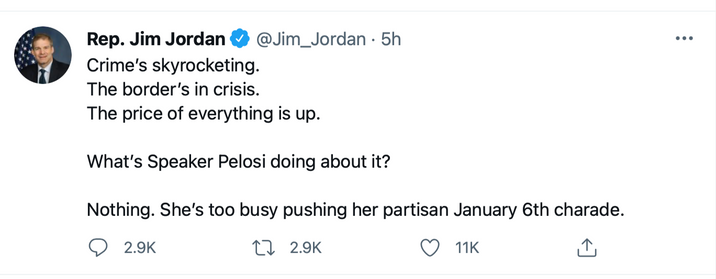

No comments:
Post a Comment